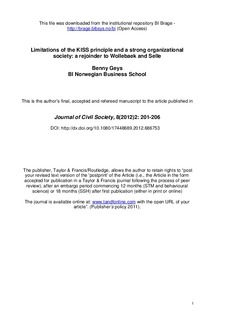Limitations of the KISS principle and a strong organizational society: a rejoinder to Wollebaek and Selle
| dc.contributor.author | Geys, Benny | |
| dc.date.accessioned | 2013-04-11T09:19:55Z | |
| dc.date.available | 2013-12-01T00:00:24Z | |
| dc.date.issued | 2012 | |
| dc.identifier.issn | 1744-8697 | |
| dc.identifier.uri | http://hdl.handle.net/11250/93868 | |
| dc.description | This is the author’s final, accepted and refereed manuscript to the article | no_NO |
| dc.description.abstract | In their discussion of my article, Dag Wollebaek and Per Selle agree with my central point that changes in the institutional and socio-political context are likely to affect the engagement-values relation over time, and that more theoretical and empirical research is required to better understand the underlying connections. They then highlight a number of weaknesses in my empirical analysis. First, they criticise the operationalization of the isolated-connected distinction I borrow from Paxton (2002, 2007), and point to the scope of engagement as a way of ‘keeping it simple’. Second, they express disbelief in the apparent strength of the correlations at the individual level compared to the aggregate level in my analysis, and assert that an ‘organizational society of broad scope’ is primary. In this rejoinder, I briefly discuss both comments. | no_NO |
| dc.language.iso | eng | no_NO |
| dc.publisher | Routledge | no_NO |
| dc.subject | voluntary associations | no_NO |
| dc.subject | generalized trust | no_NO |
| dc.subject | longitudinal analysis | no_NO |
| dc.title | Limitations of the KISS principle and a strong organizational society: a rejoinder to Wollebaek and Selle | no_NO |
| dc.type | Journal article | no_NO |
| dc.type | Peer reviewed | no_NO |
| dc.source.pagenumber | 201-206 | no_NO |
| dc.source.volume | 8 | no_NO |
| dc.source.journal | Journal of Civil Society | no_NO |
| dc.source.issue | 2 | no_NO |
| dc.identifier.doi | 10.1080/17448689.2012.686753 |
Tilhørende fil(er)
Denne innførselen finnes i følgende samling(er)
-
Scientific articles [2181]
